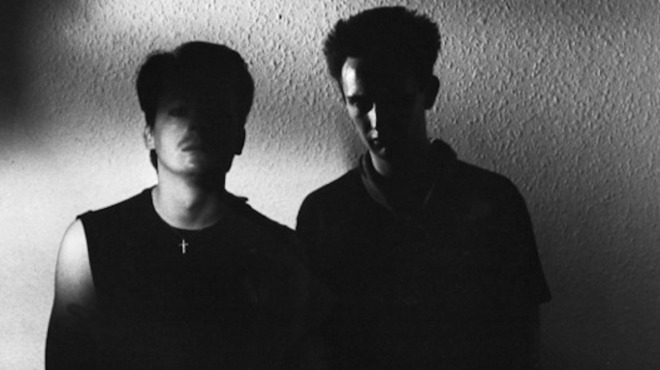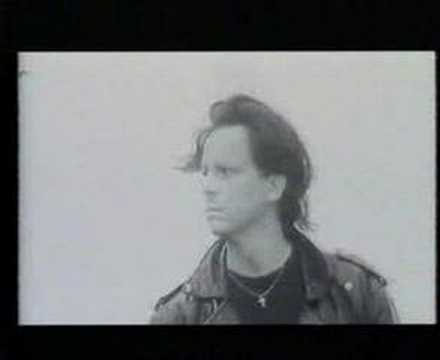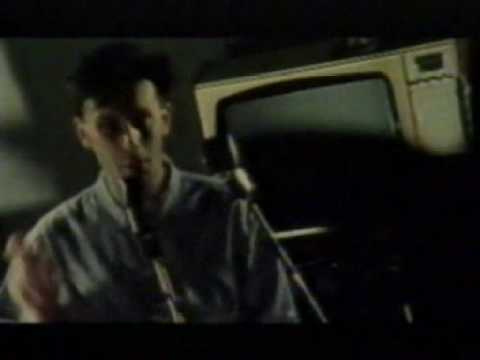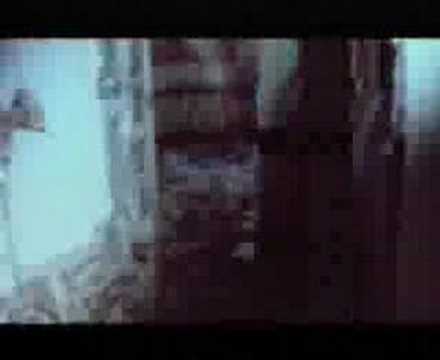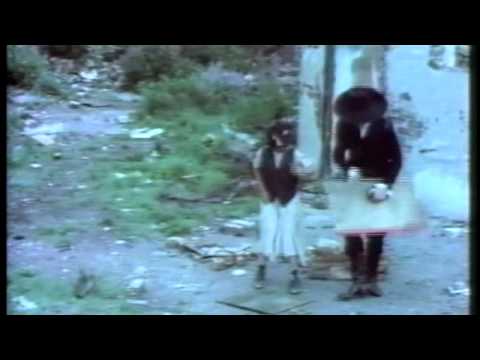Recently Mute records released a fine Cabaret Voltaire box set. As far as this writer’s concerned, it’s good enough to make the pupil dilate and the pulse quicken. (It also costs enough to make the wallet flinch – just don’t buy it the same month as the label’s 17 disc Can vinyl box set…) It’s weighty enough to terminally floor a Thomson’s gazelle going at full stretch and well enough packaged to still play afterwards. The band’s three albums from the 1983 – 1985 period, The Crackdown, Micro-Phonies and The Covenant, The Sword And The Arm Of The Lord are included and have been remastered from original tape and are included on vinyl and CD. Likewise, the EP Drinking Gasoline is included in both formats. Also present on CD is a compilation of 12” versions and the previously unreleased instrumental album Earthshaker – the OST to an unrealised film project which contains an awesome reworking of ‘Sensoria’. Last but not least is are the two DVDs, containing a couple of live gigs, the Gasoline In Your Eye film and four promos, as well as a 40 page book.
However, if this was just a fancy box set with a lot of shiny geegaws and baubles, designed to sucker in people exactly like me – with its content of stuff I’ve mainly got – it would be worth precisely fuck all. However it’s not just a box set to me, it’s a perfect wormhole of audio, video, aesthetics and philosophy, taking me back to when British music was in a time of great flux. To a time when people were reacting in all sorts of different ways to the dissipation of post punk’s energies. To a time when a lot of artists who had thrived in the 1978 – 1982 period were now beginning to flounder – but some were just starting to flourish in radically different areas.
Such are the partisan feelings aroused by forward thinking Sheffield unit Cabaret Voltaire, that even some of their own fans think of them as losing their way during this period. It’s easy to see why; the material that Chris Watson, Stephen Mallinder and Richard H Kirk recorded between 1973 and 1982 is exceptional for its day. However, as this box set should prove conclusively, so is the material that the Cabs recorded as a duo between 1983 and 1985. It is a muscular assortment of tough, genre-defying electronic dance music, influenced as much by the grim paranoia of life in Thatcher’s Britain and the rapid mutation of what was known as industrial, as by the electro coming out of the clubs of New York and forward-thinking avant funk records like My Life In The Bush Of Ghosts.
It was no wonder that the music that the duo produced during this short period went on to influence a score of would be techno producers back in the States. Noisy, messy, non-standard music will always be privileged over music aimed squarely at the dancefloor in some quarters and some will always punish a band for wanting to progress, preferring them to stick to what brought them to their attention in the first place. However for me Chris Watson leaving was the best thing to happen to the Cabs. If you listen to everything they did as a trio, including Methodology ‘74/’78 The Attic Tapes, they covered a hell of a lot of ground. This way we get what I think of as The Cabs’ imperial period and Watson as an innovative and immensely enjoyable field recordist. It certainly feels to me like a luxurious case of having one’s cheesecake and eating it.
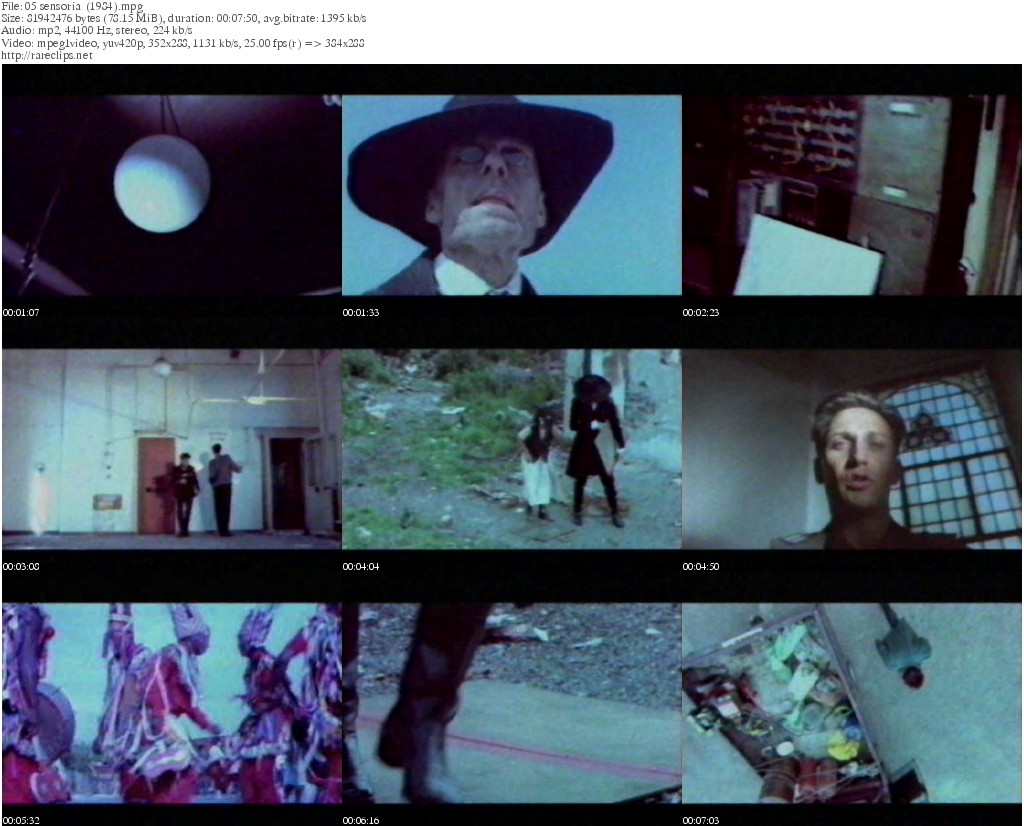
What did you have to do to marshall all of this material for the box set?
Richard H Kirk: It’s been a mammoth task to be honest. I had to go through the list of everything Virgin had in storage, making sure that all the production masters (which had been done by Porky – George Peckham – our chief mastering engineer, who was with us from ‘Nag Nag Nag’, through this period and beyond) were there. When I had the right tapes they were sent off to be baked because of sticky tape syndrome which affects the Ampex tapes we were using, and then transferred onto digital files. Once that was all cool, they were sent to Denis Blackham who now masters most of the stuff that I’m involved in, and does a fine job. After the audio it was a case of getting all the video footage, the promos and the Gasoline In Your Eye film. Going into a video edit suite, sorting all that out and getting it authored. And there was the research as well. I did the sleeve notes and it was a case of looking through the archive and making sure I got my facts right and wasn’t talking through my backside.
Did you have to speak to anyone before you started? Did you talk to Paul Smith, Peter Care or Stephen Mallinder for example?
RHK: I didn’t speak to anyone. It was my gig, if you like. So I just got on with it. I’ve been in touch with Peter Care anyway, ever since we collaborated on the Johnny Yes/No Redux project. And I’m always in touch with Paul… but it wasn’t like I was asking them anything. I just sorted my project and got on with it. I think it would have been more complicated if there had been more people involved. It probably would have dragged on for another two years if they had been.
How did you decide what unreleased stuff was going to go in the box and was there any stuff left over that was unusable?
RHK: The only unreleased audio included was the music that we did for the Earthshaker film project which sadly never got made.
Was Earthshaker going to be the film that was going to follow up Johnny Yes/No?
RHK: Well, they weren’t linked but yeah. Peter Care was going to direct it. Johnny Yes/No was actually done in 78/79 but wasn’t released until the early 80s. It was water under the bridge by that point. We were running the Double Vision label with Paul Smith and just getting really really interested in video and film. It was really important to me. I would often get frustrated because of the way things had gone [after signing to Virgin]. With every song you’d feel obliged to have vocals on it and a regular song structure and I was missing the earlier more experimental period. A lot of that frustration got focussed into potential film soundtracks.
Well it’s a shame that the film never got made it sounds interesting from the treatment that’s in the book…
RHK: That’s the original typed treatment in the book. That’s why it has a different typeface. At one point because of the Virgin connection we were talking to Palace Pictures about making it. I think at that time we were only asking for something like £15 or £20,000 to shoot it. And like it says in the script we could have adapted it to any kind of budget. But we couldn’t get the finance to do it in the end so the footage we had already shot and some of the music ended up being used for Gasoline In Your Eye. And that turned out pretty good if you ask me.
A lot of the stuff in the box, like the Earthshaker soundtrack, the Gasoline In Your Eye film and how full on the live DVDs are, really contradicts this weird notion that you’d completely abandoned your leftfield roots.
RHK: The idea that we went dead mainstream is bollocks. I know which people are saying that and I don’t want to get into it. Perhaps Mal had more of a mind to be more commercial, I don’t know but I always stuck to my guns and that’s why for the last couple of albums we did [during this phase] we took it back to Western Works and I was behind the desk. A lot of people pooh pooh The Covenant… but to me that’s one of the best albums that we did. Maybe the production values aren’t quite as posh as the stuff we mixed in the studios in London and if I went back and remixed it now I’d probably add some sub bass in there. [laughs] But I think it’s nonsense to suggest that we lost touch with our avant garde roots. I don’t know if you got hold of that box set that I put out on Intone, Archive: #828285 Live. The third disc which was recorded live at the Toronto Concert Hall, in 1985 is just fucking mental. The DVD from Hammersmith Palais that’s part of the box set is another favourite because you can see the visuals… well, it’s not that clear because they were from VHS and they’re the only documents that were really available because we didn’t do too much TV. But when I saw that I thought, “Fucking hell…” I was really proud of that because you don’t see too much stuff like that anymore. I was really made up with it. It’s in your face. Anyone who can describe that as diluted pop music must be deaf. Or blind!
Ok, let’s go back to the start of this period, which you’ve described as a distinct phase in Cabaret Voltaire’s career. Would it be fair to say that this phase started with the departure of Chris Watson?
RHK: Er, yeah. It was sad when Chris left. We were kind of thinking, “What shall we do? Shall we start a new band?” But then we thought, “No, we’ve put too much of our time into this project.” And it was a shame that he wanted to leave but it was all amicable, I mean I’m still in touch with him and have been all through the years. I think he just wanted to move on and be part of a more settled situation and got offered that job up in Newcastle and decided to move up there. It totally came out of the blue because he never mentioned it. Actually – I don’t know if it was after the The Crackdown or Micro-phonies – Chris did express an interest in coming back but I don’t think it was ever going to work, things had moved on too much. But after he left, for us it was a case of not wanting to repeat what we’d already done. On top of that we were getting into a lot of black dance music and technology had started to change. We never planned stuff out, it was all just instinct and that’s where instinct led us. And I think it was the right direction to take. I couldn’t see any point in us going back and covering the same old ground because we’d done all that experimental stuff from the mid 70s through to the early 80s.
Personally speaking, I find the notion of four four electronic dance music in 1982 not being revolutionary, kind of laughable.
RHK: Well, a lot of the dance music we were hearing out of New York in that period, the electro, sounded totally experimental to me. It was far more interesting than listening to all the people who had come up after us, copying what the Cabs and Throbbing Gristle had already done. These people trying to be disgusting and outrageous – it just seemed really dated. The influences for electronic dance music had come across from Europe via Kraftwerk over to New York and they’d done something else with it. If you listen to music from the time like Hashim’s ‘Al Naafiysh (The Soul)’… how can you not think, “Fucking hell!” You hear that in a club on big speakers and it blows you away. And that was the area we were looking at going into. This music had dance beats but it had all this other madness going over the top of it like cut up voices and all kinds of stuff. It seemed like that was were it was happening.
How did you first meet Stevo and what attracted you to Some Bizarre?
RHK: Stevo used to ring me up when I was still living at my mum’s in the early 80s. He was living at his mum’s. When he rang up you could hear her Hoovering in the background. He asked us to play at one of his futurist nights, with The The at Retford Porterhouse about 30 miles outside of Sheffield. We went and met him and he seemed like an interesting character so we kept in touch. He invited us down to Top Of The Pops when Soft Cell got to number one and if you look at the clip you can actually see Chris there at the front! It was interesting just to experience that because we were from a totally different scene. We weren’t really involved with mainstream stuff but it just seemed interesting that someone like Soft Cell who were kind of a weird synth band – a really good weird synth band, I was a fan of theirs – were able to get commercial success. And that really stuck with us. Well, it really stuck with me and it probably stuck with Mal. Whether it stuck with Chris or not, I don’t know. Stevo got in touch at the time we were doing Double Vision with Paul Smith. He came up with this idea that he wanted to put Cabaret Voltaire into a commercial studio in London to record an album. He would put up £10,000 for studio costs. It wouldn’t come to us, it would go directly to Trident Studios. And the only thing he asked us was, “Can you make the vocals a little bit less processed and could you make them higher in the mix?” He also offered to lend us £5,000 to set up the video duplication. Paul used that money to get a U-matic video machine. He was running off copies, five or six at a time. We weren’t signed with [Stevo] at that point so there was no pressure. We got put with Flood, who engineered the first two albums of that period and it seemed to work. We got on really well with him and he was into experimenting in different ways. He helped us use some technology we’d never used before. We learned a lot.
Was this how you came to work with Dave Ball?
RHK: Yeah, obviously we got introduced to Marc [Almond] and Dave because of the Stevo connection and I think it was Stevo who suggested Dave come into the studio. I think it was ‘Animation’ and ‘Crackdown’ that he helped programme the drum machines on and he had a DMX which was the way cool drum machine that all the people in New York were using. He also had a Prophet V synth. He came down and laid down some rhythms. I added to that. Mal added some bass and some vocals and that’s how simple it was really. I think ‘Animation’ was just called ‘The Jam’ originally because that’s what it was – pissing about in the studio. It was great to work with him. He’s a very talented guy.
Do you think that Stevo saw you as a potential chart act?
RHK: Well, er… probably. [pause] I imagine he did. [pause] But whether we did or not… I don’t know. It was just an experiment for us and we were just seeing how far we could take it. We wrote The Crackdown in four days. We turned up in the studio with only one and a half ideas on tape with us.
What was the process like? Was it all done on the hoof?
RHK: Yeah. I’d got a Roland CSQ-100 Sequencer and a Roland SH09 Synth and a TR-808. I’d had the 808 for a while and not really used it but I was noticing that people were using them on these electro records. I was writing stuff on the sequencer and drum machine and we’d build stuff around that. I’d add some keyboard lines, chuck on some cut up tapes and Mal would add some bass and vocals. It was just a case of building stuff up. It was exciting going from eight tracks to 24, starting to multitrack different instruments and layer up the vocals.
What do you remember about playing the opening night of the Hacienda in May 1982?
RHK: Very Little! [laughs] We were mates with the Factory people and we’d worked with them in the past. We’d played the original Factory club at the Russell in Moss Side. I remember when the Hacienda opened up on the Friday night there was a private party which New Order played and it wasn’t open to the public. I think we decided not to go to that because we would have ended up fucked up for that Saturday night. [laughs] Because we did like to party, make no bones about it. But I don’t think there were that many people there on the Saturday night and the acoustics were absolutely terrible but you know, there was something about that place. Something really good. I went there many, many times and not just to play but to watch bands and to hang out.
What about The Final Academy show at The Ritzy in Brixton, in October 1982?
RHK: Yeah. Well, as you know we were all mates with Throbbing Gristle who had sadly split up and then Sleazy and Gen went on to form Psychic TV and we were kind of involved in that a little bit. We made a video piece for a Psychic TV release, that I don’t think ever saw the light of day and obviously being totally into [William] Burroughs it just seemed like it would be fantastic. Brion Gysin was there. John Giorno was there. Psychic TV, Last Few Days and maybe 23 Skidoo as well. We were performing more of a low key ambient piece where the films were important and the soundtrack less so.
Did you meet Burroughs?
RHK: Yeah. I met him in Belgium when we went over to do the Plan K festival in 1979 with Joy Division.
How did you get on with him because he told Ian Curtis to fuck off didn’t he?
RHK: I don’t know if that’s true you know. I’ve heard people say that but every time I met Burroughs – and you have to remember he was quite elderly then – he just seemed like a really charming old guy. Whether he’d tell someone to fuck off… I don’t think he’d do that.
How did you get on with him?
RHK: I was just in awe you know? The first time I met him I just said, “I’m a friend of Genesis P. Orridge. I love your work.” And I gave him a Cabaret Voltaire badge which he put in his pocket. And then we met him again at The Final Academy show and there was a dinner at the F1 Studios and there were a lot of people there, mingling. Derek Jarman was there with his Super-8 camera filming everything. I often wonder what happened to all that footage… that would be quite interesting to see if it exists. But… what do you say to someone who’s had that effect on your work and on your life?
Would you say that a lot of his methodologies and perspectives have influenced the process of Cabaret Voltaire?
RHK: Oh God yeah. Make no mistake about it. But, we were doing that kind of cut up thing before we heard of Burroughs because we were more influenced by the surrealists and the Dadaists. Tristan Tzara was creating poetry like this forty years earlier by pulling letters out of a paper bag and composing poems. But it was great when I finally got Naked Lunch in 74/75 which was really difficult to get hold of. I had to order it from a bookshop in Sheffield and it took about a month to arrive. We kind of knew about Burroughs from Bowie. He was demonstrating his cut up lyric technique on that Cracked Actor documentary and also there was this band called The Doctors Of Madness a pre-punk band that I used to really like. And their intro tape was a reading from The Naked Lunch all about ramming the QEII into New York harbour which I thought was fantastic. I met him again in 85 when we went to the bunker in New York. We spent a week there at the end of the American tour and got down to meet him and Giorno. There are some photos of us all together, we gave a track to Giorno’s Poetry Systems label called ‘Dead Man’s Shoes’ which came out on an album called A Diamond Hidden In The Mouth Of A Corpse. And that was like, “Fucking hell man!”
The Crackdown got comfortably into the top 40. I was wondering if it introduced you to anything positive or negative that you’d previously been unaware of?
RHK: No. I don’t think so. Contrary to what people might think there was absolutely no interference from the record label. The remixes for ‘Crackdown’ and ‘Just Fascination’ were done and finished before we even went to Virgin so it was kind of a done deal. We thought it was quite good going to Virgin because they’d put out quite a lot of Krautrock music we were into by Can and Faust. They were obviously doing both strange and commercial music. We’d always done press and photo sessions even when Chris was in the band. The only difference I noticed was we got a bit more money to play with for promotional videos with Peter Care. So we’d try and make little films instead of promos. And the distribution we had with Virgin was better than what we had with Rough Trade. But really I think [the album] got a chart placing because it was released in August and no one released records in August back then. Everything shut down and everyone went on holiday. It was circumstance as much as anything else. Virgin were very cool though, they never forced us to do anything
When you look back at the 1980s now it seems unbelievably far away to me in a lot of respects. The idea that a major label would give a band that much money and that much creative freedom and access to the right technical gear, seems amazing to me now. And it wasn’t just you, there were bands like The The recording a different video for each track on Infected and things like that.
RHK: That The The film was fantastic. I remember when it came out we went to the Electric Cinema in Notting Hill and Stevo had invited all of these executives from CBS in America and that was fantastic. I think Sleazy directed a lot of it. The fact that you could do that… it was totally subversive and totally unlike normal pop promos. You are right… but I guess the only saving grace these days because of the cheapness of the technology you can do all that stuff yourself. There’s promotion of course but that’s where the internet comes in.
It feels like the John Robie remix of ‘Yashar’ that you did for Factory just before this period was really important in shaping the way you looked at 12”s. What did you learn from him?
RHK: I think what we learned was how to strip things away. A lot of Cabaret Voltaire up until that point had been very full I think. There was a lot going on. You learn that for a record to work in a club it needs to be a bit emptier; a bit more minimal and stripped back to the beat. The original version of ‘Yashar’ was very full. He took bits out of it and added bits of his own and we took that on board. We did look at remixing as a collaborative project. We’d always go into the studio with the remixer. It wasn’t like it often is today when you just send the files off to someone.
Did you get any sense, either at the time or in retrospect, that you’d become part of a feedback loop – that you’d taken influence from black American dance music of the late 70s through to the early 80s but were then starting to influence black electronic dance music of the mid to late 80s?
RHK: I didn’t know about that until much later. About ten years ago I did a box set called Conform To Deform that had a lot of unreleased stuff on it. And the guy who was helping out with press, Neil Jones, who sadly passed away a couple of years ago, he was getting quotes from different people. He was getting people who had been influenced by us. And I was kind of blown away when Ralf Hutter from Krafwerk came back with this quote saying, “brothers of the industrial folk music” and I was like, “Wow!” And then he gets a quote from Derrick May saying that everyone loved Cabaret Voltaire out in Detroit, that dude [legendary DJ] The Electrifying Mojo used to play us. He was going on about all these people like Frankie Knuckles and Ron Hardy… and it was like, fucking hell, I didn’t know anything about that. At the time we were totally unaware of it.
Did you see Micro-Phonies as a chance to consolidate what you’d done with The Crackdown?
RHK: Micro-Phonies was that “difficult second album” in some respects. The Crackdown was done in a studio in London, recorded and mixed there and by the time we’d covered the studio costs and given Stevo one third of the money, Mal and I had about £16,000. So we were becoming aware that maybe working in these expensive studios in London wasn’t that much of a good thing. So when the next advance came we decided to upgrade Western Works up to 16 track on two inch tape and then get Flood up to Sheffield so we could spend a lot more time doing the next album without the clock ticking. Micro-Phonies was a bit of a tangent really. As an album I think it turned out fine but we got a really bad critical response to it, even though now people say it’s a good album. So we were a little bit upset which is why we went back to Western Works and started doing Drinking Gasoline straight away.
It must have been some consolation how big ‘Sensoria’ was getting. I mean that got played all over the TV.
RHK: Oh yeah but that was partly because Peter Care’s video for it was just so fantastic. The 12” was great as well. It was ‘Do Right’ and ‘Sensoria’ cut together. We wanted to work with Robin Scott who put out [the single] ‘Pop Music’ as M. He’d been getting into a lot of electro and hip hop and stuff. He said that a lot of the stuff off the album was in the same key and that it would be really easy to cut two of the tracks together. And that’s what we did. We took the multitrack and edited bits of both songs together. We didn’t use the stuff we did with Robin in the end but someone like Simon Draper at Virgin said, “Why don’t you work with this guy Johnny Potoker, who’d worked as an engineer on My Life In The Bush Of Ghosts with Brian Eno and David Byrne and also worked with Miles Davis. We went into Townhouse Studios on the nightshift and Tokes was great, really fantastic, very well organised. A lot of [how good the 12” is] is down to him. But Peter did a really great job with the video. [laughs] Do you know how impressive the up and over shot really looks in the video? Well it was really just a couple of girders with a camera bolted on to it! A guy called Tony Hill invented the rig. He was a filmmaker that Peter knew. He also made a rig that would allow you to strap a camera to yourself. You can see Mal wearing it in the video. In the mainstream you’d have all these expensive things like Steadicam and cherry pickers but these were lo-tech versions of all that.
You’ve said before that the artist’s job is dissent and this period coincides with the worst excesses of Thatcherism…
RHK: Well, the miner’s strike was on at this point.
How did you react to her terms in government and were there any songs that were written in a direct or indirect response to what was going on?
RHK: We weren’t fans of people who used politics in a sloganeering way, like The Clash – it was too unsubtle for us. Mal tended to write about alienation and paranoia. But there were other things going on like the cold war, the state of the country – especially in the North, the way you had three million people unemployed and the miners strike… We’d be driving round in the tour bus and getting pulled over at police checkpoints because they thought we were flying pickets. You were conscious of it… but at the same time we were having the time of our fucking lives… We were very conscious of it and very opposed to [her] but I don’t think you’d find anything on any of those albums that gets specific about anything. I don’t think Mal got specific about anything when he was writing.
Do you feel like The Covenant, The Sword And The Arm Of The Lord is the overlooked 1980s Cabaret Voltaire album?
RHK: I think in terms of critics yeah, it probably is. You have to remember that the single ‘I Want You’ is what got us signed to EMI. They obviously saw some commercial value in it… But yeah, it was overlooked but like I say, it’s one of my favourites.
About three years ago when you first started using the Cabaret Voltaire name again after a break that you were thinking of making new music live under the name but probably more as an art project rather than playing live in rock venues. Have you had any more thoughts along those lines?
RHK: I’ve had a lot of thoughts along those lines but I haven’t squared anything off yet. I’ve had a lot of offers… Berlin Atonal festival want me to do something next year but I’ve just been too busy to sort anything out yet. But this is how it will happen. At the moment because I’ve been working on the box set and the other reissues I’ve not had time. Actually it’s also because I’ve been working on a new solo record.
Which of your three million names will it come out under?
RHK: It will come out under my own name. I started the album this time last year and it’s nearly finished. I’ve had quite a good move forward this year. I’ve signed a distribution deal with Cargo and that will be my first release when it comes out next year. That’s an ongoing thing. So I’ll be releasing more of my own work and maybe even some more live Cabs stuff on CD and possibly vinyl. At least I’ve got the machinery in place to physically release stuff instead of just doing digital downloads. I’ve now got the means to start releasing CD and vinyl again.
What can you tell me about the new solo album?
RHK: I’m just about to start doing some vocals on it. The last thing I did was some guitar overdubs on it; albeit guitar that’s heavily processed. I’ve been describing it as Krautrock meets techno meets guitar feedback. And quite possibly meets Captain Beefheart. Make of that what you will! I’ve got another release coming out. I’ve got three albums which I made about three years ago which were only available as downloads and they’re going to be a box set of CDs. One of the CDs is Orchestra Terrestrial, a project I’ve done before which is classical music influenced, but done with analogue synths. There’s another album called Reality Is Opposite which I’ve done under my own name, which is breakbeats and guitars and cut ups. And one called Arpeggio 13 which is exactly what it says, analogue arpeggios. And I think that gives a nice overview of the kind of music I make at the moment.
#8385 Collected Works 1983 – 1985 is out now on Mute

